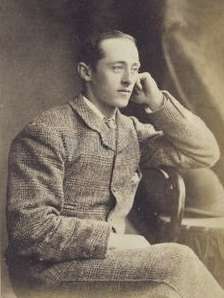Edward Tylecote
Edward Ferdinando Sutton Tylecote (23 June 1849 – 15 March 1938) was an English cricketer. He was born in Marston Moretaine, Bedfordshire and was educated at Clifton College and played first-class cricket for Oxford University and Kent County Cricket Club. He also played six Test matches for England. His career lasted from 1869 to 1886.[1] by Don Ambrose][2]
 | ||||||||||||||||||||||||||||||||||||||||
| Personal information | ||||||||||||||||||||||||||||||||||||||||
|---|---|---|---|---|---|---|---|---|---|---|---|---|---|---|---|---|---|---|---|---|---|---|---|---|---|---|---|---|---|---|---|---|---|---|---|---|---|---|---|---|
| Born | 23 June 1849 Marston Moretaine, Bedfordshire, England | |||||||||||||||||||||||||||||||||||||||
| Died | 15 March 1938 (aged 88) Hunstanton, Norfolk, England | |||||||||||||||||||||||||||||||||||||||
| Batting | Right-handed | |||||||||||||||||||||||||||||||||||||||
| Relations | Henry Tylecote (brother) | |||||||||||||||||||||||||||||||||||||||
| International information | ||||||||||||||||||||||||||||||||||||||||
| National side | ||||||||||||||||||||||||||||||||||||||||
| Test debut | 30 December 1882 v Australia | |||||||||||||||||||||||||||||||||||||||
| Last Test | 14 August 1886 v Australia | |||||||||||||||||||||||||||||||||||||||
| Career statistics | ||||||||||||||||||||||||||||||||||||||||
| ||||||||||||||||||||||||||||||||||||||||
Source: CricketArchive, 5 June 2020 | ||||||||||||||||||||||||||||||||||||||||
Highest innings record
When he was 19, Tylecote set the then record for the highest score ever made in a cricket match when playing in a school match at Clifton College; he was playing for the Classicals against the Moderns. The Moderns batted first, scoring 100, with Tylecote taking three wickets. He then opened for the Classicals, and although this was a one-innings match, the game was continued until all the Classical players had an innings. Tylecote's innings covered three afternoons and six hours as he amassed 404 not out: the first quadruple century in a cricket match. The next highest score was 52. Tylecote scored one seven, five fives, 21 fours, 39 threes, 42 twos and 87 ones, all of which were run except for one four hit out of the ground. The record has since been exceeded – by another Clifton College schoolboy AEJ Collins – who scored 628 not out.
Oxford University, Kent and England
Tylecote went on to Oxford University, winning his Blue in 1869, 1870, 1871 and 1872. He was captain in the last two of those years. He went on to play for Kent in 1875, and he continued to play for them to 1883. Tylecote also played some cricket for his home county of Bedfordshire, which is not a first-class county, from 1870 to 1877.
He was a member of the Honourable Ivo Bligh's team to Australia to recover the Ashes in 1882/3. A fully representative England side had lost to Australia at home for the first time in 1882, after which a mock obituary to English cricket had appeared in The Sporting Times. The joke at the time was that Bligh's tour was going over to Australia to recover the ashes. This he succeeded in doing, by beating the team that had beaten England two-one, and afterwards Bligh was presented with an urn with ashes in it by some Melburnian ladies as a memento. A poem was attached to the urn, which memorialises Tylecote's contribution, along with the contributions of a number of his teammates:
Career outside cricket
Outside of cricket Tylecote taught mathematics at the Royal Military Academy in Woolwich from 1875 to 1895, as well as teaching in some preparatory schools. His hobbies included collecting butterflies, and he left his collection to a museum in Oxford. He died in Hunstanton, Norfolk, in 1938.
References
- Brief profile of E.F.S.Tylecote, CricketArchive. Retrieved 2020-06-05. (subscription required)
- Edward Tylecote, CricketArchive. Retrieved 2020-06-05. (subscription required)
External links

- Edward Tylecote at ESPNcricinfo